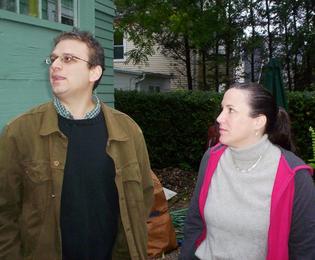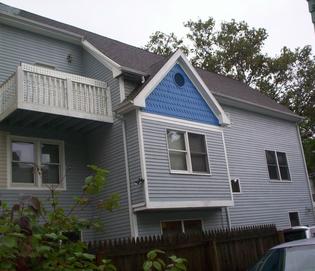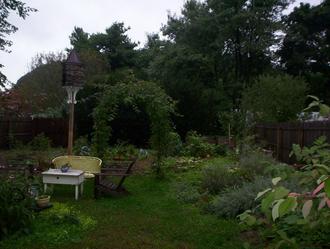 This guy had a small house. He made it a big house. A really big house. A McMansion four times the size of the house next door. His neighbors are mad at him. They say he’s wrecking one of New Haven’s charming 19th-century-era blocks. He begs to differ.
This guy had a small house. He made it a big house. A really big house. A McMansion four times the size of the house next door. His neighbors are mad at him. They say he’s wrecking one of New Haven’s charming 19th-century-era blocks. He begs to differ.
The nasty, long-running dispute on one-block-long North Bank Street is about more than a handful of neighbors who don’t get along. It concerns the future of New Haven neighborhood streets. Should they preserve a small scale and historic feel? Or should they grow up and out, like communities in Fairfield County and northern New Jersey? What role should zoning play?
And: Who should move to the suburbs? Who should stay in the city?
The story began when Mike Lotto decided the old 1,000-square-foot house he bought on North Bank Street in 1989 was too small. He demolished it. He built a new home twice the size. Then he got to work on an addition which included a two-car garage and two stories of living space. All told, he eventually squeezed 4,000 square feet onto his lot. He pushed to the edge of his back yard and side yards. His new edifice towered over the 1,000-square-foot houses next door. And it transformed the modest scale of the northern side of the street, which is one block from Wilbur Cross High School in the East Rock neighborhood.
Lotto has been building the new house in stages. He’s still not done. He had to go to the Board of Zoning Appeals three separate times for special permission because his plans, which kept growing, came closer to his neighbors’ property and rose higher into the air than zoning laws permit.
Each time the zoning board said yes. Lotto lives in the house with just his partner. He told the board his grandfather was sick and might have to move in one day.
The last time he sought a zoning variance, in 2002, neighbors showed up to urge the zoning board to stop letting Lotto build out. They said they were losing their privacy; one neighbor, Bill Deresiewicz, transformed an asphalt driveway into a movie-set-like backyard garden and sitting area. Lotto’s new back addition rose up and towered over the garden like a grim reaper. It also darkened the once-sunny rooms inside Deresiewicz’s home.
The neighbors returned to the zoning board to complain that Lotto wasn’t even meeting the requirements of the variances he’d received for how far out and how high he could build his new home. The city issued a cease-and-desist order; the dispute should return to the zoning board in December.
Meanwhile, a once neighborly street has descended into squabbling over property lines, gossip about people’s personal lives, calls to the police and to building officials, and complaints about whose dog poops on whose lawn.

“Our privacy has been destroyed,” Deresiewicz complained one recent morning while surveying the shadows in his picturesque garden. Deresiewicz, a Yale English professor, and his wife Aleeza Nussbaum, an artist, live next to door to Mike Lotto. They said Lotto’s 28-foot-by-28-foot addition is decreasing their property value, not to mention their quality of life. “You’re sitting in your garden, and suddenly there’s an apartment building next door. Two stories up, you still can’t see the sky.”
Michelle Maitland and Alderman Ed Mattison joined Deresiewicz in the garden to recount their extended battle with Lotto. Maitland has occupied a 1,100-square-foot single-family home on the other side of Lotto’s for 10 years. She called Lotto’s house “ugly and too big for the street.” Maitland, who works at Neighborhood Music School, questioned why the zoning board routinely approves Lotto’s requests to exceed legal building limits: “What’s the point of zoning” if the rules aren’t adhered to?
The Board of Zoning Appeals routinely says yes all over town, observed Mattison. Mattison lives around the corner from North Bank on Anderson Street. He said the zoning board “has this mistaken notion that because New Haven used to be a place where it was hard to get people to invest,” the zoning board’s primary mission is to promote economic development, to build the tax base.
Big House = More Taxes
 “It’s a city,” Mike Lotto responded with a shrug. He flipped sizzling pancakes in his spacious kitchen as his neighbors simmered in the garden next door. “This is the trend in New Haven.” The city needs more tax money; this is how it’ll get the money. “A lot of cities, down in New Jersey, in Fairfield, they’re taking houses like this. They’re knocking them down. They’re making them bigger.”
“It’s a city,” Mike Lotto responded with a shrug. He flipped sizzling pancakes in his spacious kitchen as his neighbors simmered in the garden next door. “This is the trend in New Haven.” The city needs more tax money; this is how it’ll get the money. “A lot of cities, down in New Jersey, in Fairfield, they’re taking houses like this. They’re knocking them down. They’re making them bigger.”
If his neighbor wants a sunny garden and wide-open block, he should move to North Haven, Lotto said. Funny; his neighbors said that if Lotto wants a McMansion, he should move to the suburbs.
Lotto is 43. He grew up in East Haven and works in IT for the New York Stock Exchange. His house, especially the new addition in the back, looked like a display section in Home Depot. The frame is up, beams in place. But it’s not finished. There’s a lot left to do.
Since Lotto got his variances, his grandfather passed on. So Lotto no longer says he needs more than 4,000 square feet to move in relatives. Rather, he likes the room. And he wants to increase the resale value on his house. “I plan on staying here all my life. But who knows?”
 Lotto called his neighbor’s garden “beautiful. He’s done a tremendous job.” But Lotto said he had already submitted his plans to grow his house years before Deresiewicz moved in.
Lotto called his neighbor’s garden “beautiful. He’s done a tremendous job.” But Lotto said he had already submitted his plans to grow his house years before Deresiewicz moved in.
Lotto blamed the city for his building his roof higher than allowed by the variance. He said a building official, since laid off from the city, made a mistake on the original permit, confusing the actual height with the average height of a pitched roof. He said he was informally told not to worry about the mistake when the permit was issued. He said he had the legal right to build a 35-foot-high roof. Andrew Rizzo, the city’s top building official, said he doesn’t remember the specifics of the case, but that Lotto still must conform with the law and lower his roof.
The other issue is the width of the back addition, which comes so close to his neighbor’s garden. Zoning law requires 12 feet between the property line and a building; Lotto has cut that about in half.
If he loses before the zoning board in December, he said with a shrug, he’ll shave off a foot or so from the addition. And he’s willing to sue the city over the roof’s height. It’ll cost him money; he has already spent more than $150,000 on the project, he said. He’s willing to keep spending money. He’ll still be on North Bank Street. And he will still have a very big house.


Just to clarify, though the Board of Zoning Appeals has repeatedly said "yes" to Michael Lotto overall, each time they have done so with qualifiers (or some "nos").
One of the more recent "Nos" was in response to Lotto's request for an exception re: permissable space from a property line. That rule exists in part to protect buildings on adjoining lots in the event of a fire. Lotto's desicion to cut that space in half anyway constitures a blatant violation of the conditions of the variance.
Not only should Lotto "lose" in front of the BZA in December, but he should be assessed a stiff penalty for his violations. The City (and thus, taxpayers) are owed for the added administrative burden which his arrogance has cost New Haven.